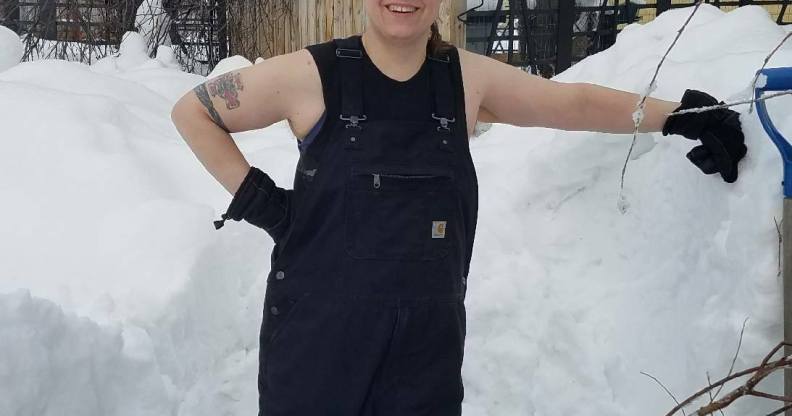Trans politician says her gender was a ‘non-issue’ in election

Some LGBT politicians in the US midterm elections have faced scathing attacks aimed at their sexual orientation. But one trans politician, Kathy Ottersten, appears to be the exception to the rule.
In the city of Fairbanks, Alaska, two transgender candidates were voted into local office at elections held on October 2 with little to no controversy: Kathy Ottersten and Liz Lyke respectively won a seat in the local city council and borough assembly and were sworn in the week of October 22.

Liz Lyke won a seat on Fairbanks Borough Assembly. (Liz Lyke for Fairbanks Assembly/Facebook)
Ottersten, who identifies as gender non-conforming trans/intersex person, says she was hoping her gender identity would be a “non-issue” in the campaign.”And it was exactly that,” the trans politician tells PinkNews.
Comparatively, around the US, gender and sexual orientation have been politicised in the midterm election cycle. In Pennsylvania, Republican state lawmaker Daryl Metcalfe, who is seeking re-election, attacked his Democratic opponent Daniel Smith, Jr. putting quotation marks around the word “husband” in captioning a picture of the couple.
In Vermont, voters could elect the first openly transgender governor if they express a preference for Democratic candidate Christine Hallquist, who has faced death threats throughout her campaign.
Why Kathy Ottersten ran for office in Alaska
“I decided to run because I felt that I would be able to do a good job with the issues we face locally and I wanted to give my time and energy to this community. The fact that I’m a gender non-conforming trans/intersex person was only a consideration in that some of my friends were worried about potential abuse,” Ottersten said.
“We deliberately choose to live in a place with a harsh environment and limited availability to things that people take for granted elsewhere in the US and Europe. Even Amazon Prime isn’t two days, it’s two weeks—no exaggeration,” she describes.
The trans politician believes that the Fairbanks community shares a culture that is accepting of diversity, whatever form this may take.
“People build their own homes, they heat with wood stoves, don’t bother to connect to the electric grid, and homeschool their kids. Any of those things would make you an outlier, or even considered a nutter, in most of the US, but not here.

The Denali National Park in Alaska is around 160 miles away from Fairbanks. Ottersten believes the city’s harsh surroundings make the people who choose to live there more accepting of diversity. (Lance King/Getty)
“LGBTQI folks are no more unusual than anybody else, and we have a large and active queer/trans/gender non-conforming community as a result,” she continues.
“Of course there are issues with us and the usual opposition to out queer people, but those folks are fewer in number and don’t have the kind of support to sow the level of hate and division that we see elsewhere right now.”
What private parts you have, who you sleep with, and how you choose to dress are nothing more than distractions. Any candidate who presents them as a focus should be rejected and repudiated.
The trans politician has had first-hand experiences of the kinds of violence and hatred targeted at LGBT+ and gender non-conforming people. “[I have] survived multiple physical attacks, including my skull getting broken in multiple places by a baseball bat in 1989, which has never fully healed,” she says.
But in the course of the campaign, Ottersten did not suffer any physical or verbal abuse, not even when she was invited to speak on a radio talk show on a local Fox affiliate, taking questions from local voters.
“I mentioned being gender non-conforming and an activist, being arrested for doing needle exchange, and working with persons with HIV and AIDS. Elsewhere it would have likely been the focus of abuse and derision, but not here.
“Each of the persons who called in had questions about where I stood on substantive local issues. Not one even bothered to mention anything about my being queer. That’s the kind of community I live in,” Ottersten says.

Trans politician Kathy Ottersten and her wife of 15 years Adrianne and their pups, Gene and Burnley. (OtterstenforFairbanks.com)
The trans politician hopes her and Lyke’s experiences can show that LGBT+ candidates, and particularly transgender ones, can be an active part of their community.
“I’ve been a trans activist for three decades and I believe the most important thing we as a community can do is be out, affirming, visible and open. Not everybody can do that, though, so those of us who can need to make it a priority,” she says.
Ottersten believes that LGBT+ people who are thinking of running for office should be prepared to encounter potential abuse, but should also enjoy the whole experience.
“No matter how large or small the race is, we are ambassadors for the queer community. All the same, we need to remember to have fun, as well.
“Campaigning is a singular experience. You get to meet and talk to more people than you likely will otherwise, you have the chance to better know the city or state you live in, and you get to engage with people on a personal level that doesn’t generally happen. There is joy and warmth available if you are open to it,” the trans politician says.
She adds: “We have dire problems to address—climate change, the rise of fascism and hate groups, the displacement of millions of people globally, etc.—what private parts you have, who you sleep with, and how you choose to dress are nothing more than distractions. Any candidate who presents them as a focus, as a wedge issue to divide people, should be rejected and repudiated.”

